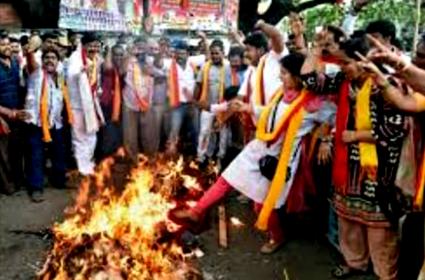When anger over Cauvery award triggered anti-Tamil violence in K'taka

Bengaluru, Aug 26 (IANS) The Cauvery river water dispute has been a flashpoint between Karnataka and Tamil Nadu from the days of British rule in the country. The regions of south Karnataka came under the Madras Presidency. Experts opine that due to its proximity to power, Tamil Nadu always benefitted but the interests of Karnataka were sidelined.
The dispute resulted in the 1991 anti-Tamil violence in Karnataka in which the state capital Bengaluru and Mysuru were the worst-hit.
The violence broke out during demonstrations following the order of the Cauvery Water Tribunal to release water to Tamil Nadu. As a result, Tamilians were forced to flee from Bengaluru and other cities. As per the official statistics, 16 persons were killed in the police firing.
After the disaster, there have been many incidents of farmers committing suicide in protest against the release of water to Tamil Nadu. Authorities have reined in the situation and controlled the law and order situation in the state, especially in Bengaluru following the orders to release water to Tamil Nadu.
Sources explain that the situation cannot be predicted when it comes to the Cauvery issue. Since Bengaluru is known as a global IT hub, the challenge is paramount to ensure the peace is not disturbed.
As per the records, the dispute between the two states started in 1890 when Tamil Nadu objected to the building of lakes and removing of silt from the lakes in Karnataka.
Tamil Nadu enjoyed all the water from ther Cauvery in the absence of dams. The Cauvery Water Dispute Tribunal ordered the release of 205 TMC of water in its interim order in 1990 resulting in the bloodshed. The final verdict came in 2007 which directed Karnataka to release 192 TMC of water.
After Karnataka appealed before the Supreme Court, the amount was reduced to 177.25 TMC in February 2018. Experts opine that since Karnataka’s claims were judicious, the amount of water to be released was reduced every time.
Captain S. Rajaram, retired Secretary of Minor Irrigation and Environment Department and expert in water resource and environment, told IANS that the role of the judiciary and the delay in connection with orders were questionable regarding the Cauvery dispute.
“On June 2, 1990, the Cauvery tribunal was formed. The tribunal took 17 years to give the verdict. The order was given on February 5, 2007. Challenging the order, the matter was taken to the Supreme Court in May 2007. The final order came on February 16, 2018, after 11 years. Why is the issue that pertains to crores of farmers taking so long? Is this issue not important? Is the issue of farmers so negligible? If petitions related to elections, raids on cinema actors, or politicians are attended immediate attention. The farmers are not seen by the courts,” Captain Raja Ram explains.
The national policy of the country makes drinking water the top priority. The government of India enacted the Inter-State Water Disputes Act in 1956 for river water distribution. Before that the disputes were handled as civil suits.
Then Chief Justice of India Ranganath Mishra in his judgment in 1990 while forming a tribunal underlines that the issue is regarding farmers’ grievances.
Thousands of farmers in four states (including union territory Pondicherry) are suffering and a solution needs to be found. “Despite the direction the tribunal took 17 years. The political parties want to keep this issue alive,” Captain Raja Ram says.
As per the statistics, 740 TMC is the available water from the Cauvery in a normal year in all three states and a union territory. Karnataka has been allowed to use 284.75 TMC, Tamil Nadu is given 404.25 TMC, Kerala 30 TMC, Pondicherry 7 TMC of water.
In addition, 10 TMC of water is allotted for environmental protection which has to flow in the river throughout. Four TMC of water is considered as an escape to sea during heavy rainfall and cyclones.
Karnataka as the capacity to store 119 TMC of water in four reservoirs -- KRS, Kabini, Harangi and Hemavathy. Tamil Nadu in its two dams, namely Mettur and Lower Bhavani, can store 129 TMC of water.
The reservoirs are not sufficient to store the available water and the Mekedatu project in which a balance reservoir will be built with a storage capacity of 67.14 TMC of water can be the possible solution as during dry season, the water could be easily provided to Tamil Nadu.
However, Tamil Nadu is opposing the project. The experts also state that water distribution is not purely a legal matter. It’s a techno-legal matter in nature and legal luminaries will have to consult hydrological experts to resolve the dispute.
The dispute has come to the fore yet again due to the shortage of rainfall in the state. Karnataka is arguing that it requires water for drinking water purposes as dams are dry and Tamil Nadu is pressing for the release. The ball is now with the Supreme Court.
--IANS
mka/ksk
Disclaimer: This story has not been edited by the Sakshi Post team and is auto-generated from syndicated feed.
























